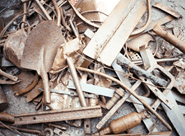Prices

June 8, 2021
June Scrap Up $50-60/gt - Sideways in July?
Written by Michael Cowden
U.S. ferrous scrap prices have settled up $60 per gross ton on prime grades and up $50 per gross ton on obsoletes, according to market participants.
“Regional markets were very consistent with the up $50 (per gross ton) on obsolete grades and up $60 (per gross ton) for primes,” one scrap executive said. “This resulted in an almost universal delivered price range for the various scrap grades.”
![]() The gains were driven by a supply-constrained U.S. market and by domestic prices playing “catch up” to prices in Turkey, sources said.
The gains were driven by a supply-constrained U.S. market and by domestic prices playing “catch up” to prices in Turkey, sources said.
“All grades had gotten to a point in May where they were tight in the U.S., and overseas shredded is also particularly tight,” a second source said.
Sources estimated scrap prices as follows:
* Prime (busheling): $640-650 per gross ton
* Shred: $500-520 per gross ton
* Heavy melting scrap (HMS): $450-470 per gross ton
* Plate and structural (P&S): $485-500 per gross ton
But while sources agreed on where June prices had settled, there was less consensus on what July might bring.
“Price expectation for July is sideways as domestic and export markets are in relative balance. And continued strong demand will keep prices at current levels,” the first executive said.
The second executive wasn’t so sure. “From here, it seems like this may be as good as it gets for pricing for a while, absent a stronger move in the export market,” he said.
Among the bearish signals moving forward are the following, the second sources said:
* Across the Pacific, prices for 80/20 grade to Taiwan have fallen by approximately $30 per gross ton in recent weeks.
* Beijing has made no secret that it wants to rein in what it considers speculation in commodity markets.
* And across the Atlantic, Turkey is grappling with a volatile and weak Lira. Also, cargoes to Turkey have already been booked for July, and material remains available for export there.
CRU senior analyst Ryan McKinley agreed that the July trade for obsolete grades in the US would hinge on the international markets.
“Developments in Asian steel demand will impact demand for Turkish finished steel and, by extension, Turkish mill demand for US scrap,” McKinley said.
At home in the U.S., prime grades will remain tight. But that tightness should ease if automakers are able to secure enough chips to ramp up production again. The result: Prime scrap should trade at similar levels in July “barring any drastic developments abroad,” he said.
Pig Iron Prices
The most recent cargoes of pig iron sold to domestic mills were transacted at $660-665 per metric tonne cfr US port. Two were from the Black Sea and one was from southern Brazil, one industry sources said.
“The CIS material is low pho’s, and the producers had been asking for a higher price than they finally settled for,” he said.
Pig iron producers have since withdraw their offers to reassess the market following prime scrap settling up. “It is thought new offers for August shipment ex Black Sea will be around $685 metric tonne cfr,” he said.
By Michael Cowden, Michael@SteelMarketUpdate.com







